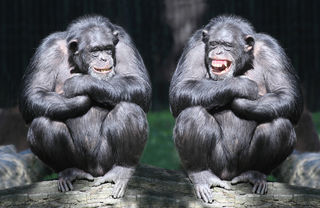Dopamine
Why We Want What Others Have
The animal brain survives by watching others and seeking what they have.
Posted July 29, 2019 Reviewed by Ekua Hagan

Social animals learn to meet their needs by watching others. Seeking what others have is the core survival strategy of the animal brain. Practical awareness of this natural impulse can help you manage your ups and downs.
Getting real with your own wants
Mammals are not born with survival skills. They wire them in by observing the survival behavior of others. When a young mammal sees others get a reward, it motivates them to seek that reward. No conscious thought is necessary due to mirror neurons and dopamine.
Dopamine is released when a mammal meets a need. The good feeling motivates a body to repeat the behavior that stimulated it. A young mammal enjoys a drip of dopamine when it observes another individual get a reward, thanks to its mirror neurons. Repeated experience wires the young mammal to expect good feelings in the ways it sees others get them.
I'm not saying you should want what others have. I'm saying you do, and when you know how you create this urge, you have power over it. Unfortunately, people often feel powerless instead. They blame society and other externals for responses they create internally. This is easy to do because our mammalian limbic system is not capable of using language. It can't tell you in words why it turns on a feeling, so your verbal brain jumps to the conclusion that the impulse came from outside you. You end up feeling powerless over your impulses.
Powerlessness feels bad. Instead, you can find your power over your limbic responses. Here is a simple guide.
An old-timey example
Captain Cook, the explorer, saved his crews' lives by manipulating their mammalian urges. He wanted them to eat Vitamin C to protect them from scurvy, which brought a horrible death to sailors on long voyages in the 1700s. The cause was unknown, but Cook observed that scurvy disappeared on German ships that served sauerkraut daily. So Cook provided sauerkraut, but his sailors refused to eat it.
The problem was solved by putting platters of sauerkraut on the officers’ table, and permitting the sailors to help themselves from the officers' platters. Soon, everyone wanted it, and Cook’s voyages were the first to escape the scourge of Vitamin C deficiency.
You want what others have.
You hate to admit it, but when you see others take pleasure in something, you want it too. Maybe not material things. Respect and attention are what your mammal brain craves, thanks to natural selection. When you see others get respect and attention, you want it too. The rational part of your brain has trouble explaining these feelings. You think you shouldn't feel this way so you blame these feelings on others. Thus you give away your power. Let's see how your mammalian limbic system produced these feelings so you can get your power back.
Monkey see, monkey do
A baby monkey sees its mother reach for fruit and put it in her mouth. The little monkey mimics the behavior without conscious awareness of nutrition. Mirror neurons activate the impulse.

A young monkey is never given solid food. It would starve to death if it didn't learn to find its own food before its mother’s milk is gone. Yet every little monkey figures it out, without the help of language and curriculum development experts. A little monkey learns because mirror neurons activate feelings of reward and threat. The dopamine of reward and the cortisol of threat are like paving on their neural pathways, wiring a young brain to repeat behaviors that get rewards and avoid pain. Without conscious intent, it wires itself to seek what others seek.
Mate-choice copying in the animal world
Adolescent mammals want the mating partners they see with others. Researchers have documented mate-choice copying in a wide range of species. This phenomenon is eerily reminiscent of high school in humans.
These facts of life are hard to accept. We like to believe that the state of nature is altruistic and pure, and we like to blame "our society" for the frustrations of social comparison. Alas, we have inherited a brain that learns from others. We can manage our brain better when we accept it. If you deny your true impulses, your verbal brain fills in the blanks with fancy theories, but you still end up frustrated. Your verbal brain becomes very skilled at blaming your frustration on others, but bad feelings linger. They can even motivate bad choices.
The pitfalls of social comparison
Many bad choices are motivated by social comparison. An intriguing example is blood-letting, a popular treatment for disease in the past. If you had money, you hired a doctor to bleed you. (This is what killed George Washington and Catherine the Great.) If you didn't have money, you urgently looked for a way to pay for this treatment. Today, many dubious treatments are available, and people urgently want “access” to these treatments because they see others getting them.
Social comparison can ruin a good day. When children are offered cupcakes, they can get upset by another child's choice of cupcake, instead of just enjoying what they have. The lost cupcake seems more valuable. When I was a mom, I tried to make all the cupcakes look the same to prevent such tussles. I would do it differently now that I understand the mammal brain. I would teach my kids to manage this impulse in the long run instead of just buying peace in the short run.
I would teach them to evaluate sauerkraut and blood-letting for themselves instead of just following others.
Self-acceptance
The mammalian facts of life are hard to accept. Indeed, they have become taboo. Instead, we are told that animals are altruistic and “our society” is the cause of social comparison. This leads many people to the idea that the path to mental health is to fight “our society.”
Alternatives appear to happen if you take off the system-blaming goggles and look directly at your natural impulses. That gives you the power to choose a new thought when necessary.
It's hard to do this because you hate to acknowledge the self-interested focus of your mammal brain. You've been told that self-interest is bad so you deny your own self-interest. You find socially acceptable explanations for your feelings. But in others, self-interested impulses are easy to see. You end up feeling frustrated with others. You can relieve this frustration by being honest with yourself.
I am not saying we should be selfish. I’m saying we are selfish, and those who deny it are promoting their self-interest by denying it. When you are honest about the core impulses of your operating system, you can control them more easily. When you deny your own impulses, you lose control over them.
You believe you are controlled by external forces so you overlook your internal power. I have written extensively on how to do this, both in this blog (here, here, and here) and in my book, I, Mammal: How to Make Peace With the Animal Urge for Social Power.




